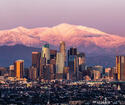Demographic transitions present political opportunities, but do not protect politicians from their own folly. The shift in most Western countries to a more racially and ethnically diverse demographic has been widely seen by left-wingers as an opportunity to cement their ascendancy. read more »
Demographics
California's Keenest Competitors for Tech Jobs are Blue Western States
For a generation, California has seen more of its residents and companies head elsewhere, but has found a way to respond, at least in terms of wealth creation, by constant innovation. But today, the Golden State’s hold on the elite reaches of the economy is slipping in ways that could threaten the state’s long-term prosperity. read more »
- Login to post comments
New U.S. Census Bureau Population Estimates: A New World?
The United States Census Bureau released its July 1, 2021 population and annual net domestic migration estimates for states and the District of Columbia on Tuesday, December 21. This article highlights trends from that release. read more »
The Pandemic as an Employment Shell Game
I have always been skeptical of the use of labor statistics. In 2009, I began to write in Working-Class Perspectives about the de facto unemployment rate, because official reports on the unemployment rate in Youngstown left out much of the story. Drawing on traditional Bureau of Labor Statistics data as well as comparative studies from the Center for Economic and Policy Research, I looked beyond how many people were looking for work to add figures for how many were underemployed, discouraged, or unable to work because of disability. read more »
- Login to post comments
A Real Rural Future
One of the far-too-often repeated statements made by urban, coastal elites is that one’s future cannot be found in the countryside. These city-centered Americans often believe that economic growth, jobs, and the nation’s future can only be found in big cities and that rural America remains a dead-end, brain-drained world with minimal opportunity. read more »
- Login to post comments
Only Interior Counties, San Benito, Riverside and Monterey Grow in 2021
Preliminary county population estimates just released by the state Department of Finance show that California’s population decline is persisting and accelerating. The state lost 173,000 residents over the year ending July 1, 2021. The Department of Finance reports that there were 56,500 Covid related deaths over the same period, which would account for about one-third of the population loss. Net domestic migration dropped to the lowest rate in a decade, down 277,000 --- more than the population of Marin County. read more »
The New Dark Ages
If ignorance is bliss, the Western world should be ecstatic. Even as colleges churn out degrees and collect fees, and technology makes information instantly accessible, the basic level of literacy, as measured by such things as reading books and acquainting oneself with the past, is in a precipitous decline. Rather than building a vital world with our technological culture, we are repeating the memes of feudal times, driven by illiteracy, bias and a rejection of the West’s past. read more »
- Login to post comments
Our Neo-Feudal Future
America has only a limited feudal past, the plantation aristocracy of the antebellum South and the enormous class chasms of the Gilded Age being pretty much our only examples. Yet today—after decades of social mobility, a digital revolution that was supposed to empower individuals everywhere, and the construction of a vigorous anti-discrimination apparatus that putatively ensures equal rights and status—a rigid new social order with feudal elements has come into view. read more »
- Login to post comments
Unicorns Can Grow in Flyover Country, But Are There Enough Tech Workers?
The experiences of three too-rare high-growth tech companies in Flyover Country illustrate how the Great Reshuffling of workers amid the pandemic has become a mixed blessing for our region. read more »
- Login to post comments
Manchin and Sinema Hold the Key for Democrats: Respecting Regional Difference
Throughout the long and drawn-out negotiations over Joe Biden's ambitious Build Back Better Act, two senators have emerged as punching bags for Democrats anxious to get the bill passed: Joe Manchin of West Virginia and Kyrsten Sinema of Arizona. The two moderates have been clear about their refusal to support the more ambitious items in the bill, and it's brought them in for censure and even some online abuse from fellow Democrats, who believe that their cratering poll numbers need Build Back Better to help them survive the midterms. read more »
- Login to post comments






















